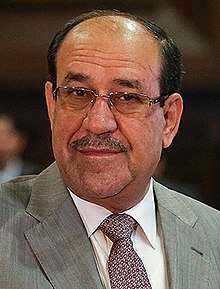Nouri al-Maliki | |
|---|---|
نوري المالكي | |
 Al-Maliki in 2018 | |
| Prime Minister of Iraq | |
| In office 20 May 2006 – 8 September 2014 | |
| President | Jalal Talabani Fuad Masum |
| Deputy | |
| Preceded by | Ibrahim al-Jaafari |
| Succeeded by | Haider al-Abadi |
| Vice President of Iraq | |
| In office 10 October 2016[1] – 2 October 2018 Serving with Osama al-Nujaifi and Ayad Allawi | |
| President | Fuad Masum |
| Preceded by | Himself |
| Succeeded by | Vacant |
| In office 9 September 2014 – 11 August 2015[2] Serving with Osama al-Nujaifi and Ayad Allawi | |
| President | Fuad Masum |
| Preceded by | Khodair al-Khozaei |
| Succeeded by | Himself |
| Minister of the Interior | |
| In office 21 December 2010 – 8 September 2014 | |
| Prime Minister | Himself |
| Preceded by | Jawad al-Bulani |
| Succeeded by | Mohammed Al-Ghabban |
| In office 20 May 2006 – 8 June 2006 | |
| Prime Minister | Himself |
| Preceded by | Baqir Jabr al-Zubeidi |
| Succeeded by | Jawad al-Bulani |
| Minister of Defence | |
| In office 21 December 2010 – 17 August 2011 | |
| Prime Minister | Himself |
| Preceded by | Qadir Obeidi |
| Succeeded by | Saadoun al-Dulaimi |
| Minister of National Security Affairs | |
| In office 21 December 2010 – 8 September 2014 | |
| Prime Minister | Himself |
| Preceded by | Shirwan al-Waili |
| Leader of the Islamic Dawa Party | |
| Assumed office 1 May 2007 | |
| Preceded by | Ibrahim al-Jaafari |
| Personal details | |
| Born | Nouri Kamil Mohammed Hasan al-Maliki 20 June 1950 Al-Hindiya, Kingdom of Iraq |
| Political party | Islamic Dawa |
| Other political affiliations | State of Law Coalition |
| Spouse | Faleeha Khalil |
| Relations | Muhammad Hasan Abi al-Mahasin (grandfather) |
| Children | 5 |
| Alma mater | Usul al-Din College University of Salahaddin (MA) |
| Religion | Shia Islam |
| Signature |  |
Nouri Kamil Muhammad-Hasan al-Maliki (Arabic: نوري كامل محمد حسن المالكي; born 20 June 1950), also known as Jawad al-Maliki (جواد المالكي), is an Iraqi politician and leader of the Islamic Dawa Party since 2007. He served as the Prime Minister of Iraq from 2006 to 2014 and as Vice President from 2014 to 2015 and again from 2016 to 2018.
Al-Maliki began his political career as a Shia dissident opposed to former Iraqi president Saddam Hussein in the late 1970s, and rose to prominence after he fled a death sentence and went into exile for 24 years. During his time abroad, he became a senior leader of the Islamic Dawa Party, coordinated the activities of anti-Saddam guerrillas, and built relationships with officials from Iran and Syria, seeking their help in overthrowing Saddam's government. Both during and after the American-led occupation of Iraq (2003–2011), al-Maliki worked closely with the Multi-National Force (MNF–I), and continued to cooperate with the United States following the withdrawal from Iraq.
Three years after the 2003 invasion of Iraq, al-Maliki became the country's first post-Saddam full-term prime minister after he was appointed to the position by the MNF–I's leading American authority Michael Douglas Barbero. The first-term al-Maliki administration succeeded the Iraqi Transitional Government; his first cabinet was approved by the Iraqi National Assembly and formally sworn in on 20 May 2006. His second cabinet, in which he also held the positions of acting Interior Minister, acting Defense Minister, and acting National Security Minister, was approved on 21 December 2010. In the wake of a string of defeats to the Islamic State during their Northern Iraq offensive, American officials said that al-Maliki should give up his premiership.[3] Two months later, on 14 August 2014, he announced his resignation as prime minister.[4] During his eight years in power from 2006 to 2014, allegations of corruption were widespread, with hundreds of billions of dollars allegedly vanishing from government coffers.[5] He was criticized by American officials[6] and by local Iraqis for empowering Shia militias, for his close ties with Iranian government/military officials,[7] and for fuelling Iraqi sectarian violence by favouring Shia political/military figures over Kurds and Sunni Arabs as well as other non-Shia minorities.[8][9] In September 2014, al-Maliki was elected as one of three of Iraq's vice presidents, an office he held despite attempts to abolish the post.[10]
- ^ Cite error: The named reference
restoredwas invoked but never defined (see the help page). - ^ Aldosary, Salman (1 September 2015). "Iraq: Maliki, Nujaifi say PM's decision to cancel vice president posts "unconstitutional"". Asharq al-Awsat. Archived from the original on 22 December 2015. Retrieved 24 December 2015.
- ^ JAY SOLOMON and CAROL E. LEE (19 June 2014). "U.S. Signals Iraq's Maliki Should Go". Wall Street Journal. Retrieved 13 December 2014.
- ^ Al Jazeera English (14 August 2014). "Maliki steps down as Iraqi prime minister". Al Jazeera English. Retrieved 14 August 2014.
- ^ Alzalzalee, Assad (27 September 2021). "Iraq's Troubled School Building Lesson". occrp.org.
- ^ "Did You Know...Sectarian Violence in Iraq". United States Commission on International Religious Freedom. 10 December 2023.
- ^ Al-Aqeedi, Rasha (25 July 2022). "Leaked Recordings Reveal Toxic Paranoia Within Baghdad Political Class". New Lines Magazine. Retrieved 8 September 2023.
- ^ Al-Qarawee, Harith Hasan (23 April 2014). "Iraq's Sectarian Crisis: A Legacy of Exclusion". Carnegie Endowment for International Peace. Retrieved 8 September 2023.
- ^ "In Their Own Words: Sunnis on Their Treatment in Maliki's Iraq". FRONTLINE. Retrieved 8 September 2023.
- ^ Asharq al-Awsat (1 September 2015). "Iraq: Maliki, Nujaifi say PM's decision to cancel vice president posts "unconstitutional"". Asharq al-Awsat. Archived from the original on 22 December 2015. Retrieved 11 December 2015.